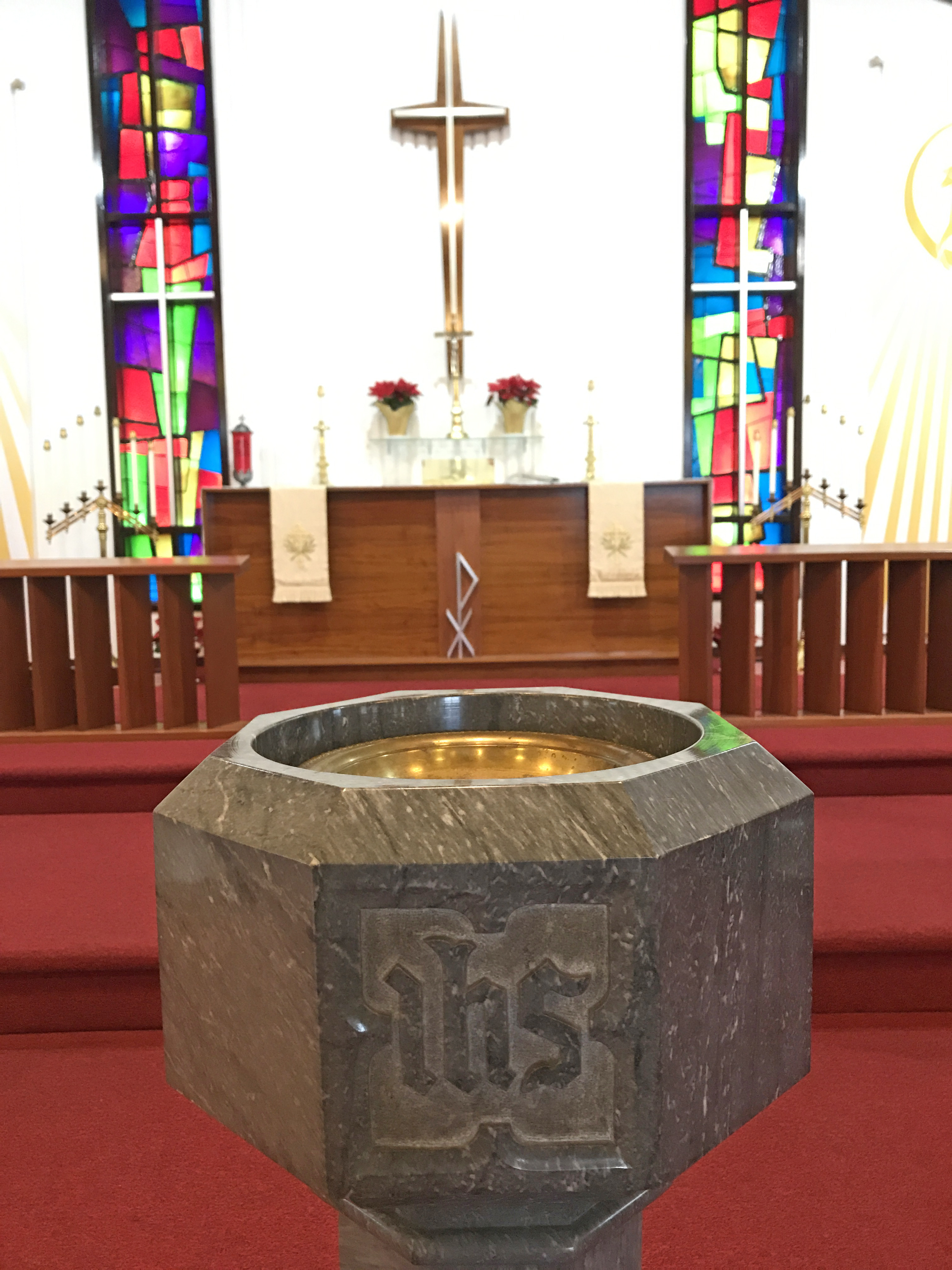✠ Psalmody: Wisdom 11:23a, 24b, 23c;Psalm 57:1a;Psalm 57:1a, 3a;Psalm 103:10;79:8-9;Psalm 30:1–2;Psalm 1:2b, 3b
✠ Lection: Joel 2:12–19; 2 Peter 1:2–11; Matthew 6:16-21
In the Name of the Father and of the ✠ Son and of the Holy Spirit. Amen.
As you sit with ashes upon your head this evening reminded of your mortality, take heart, for the Lord is gracious and merciful, slow to anger, and of great kindness; and He relents from doing harm. Even mortality is good news in Jesus Christ. It is good news in winter, spring, and summer. It is good news in somber Lent when we are bidden by God to take stock of our hearts that we might rend them and not just our garments. His good news is for the penitent, for those of a contrite heart being rent, for His merciful answer is promised to be given. A bruised reed the Lord will not break, and smoking flax He will not quench.
It is in divine grace that Jesus speaks a sincere warning to those whose hearts He desires to belong to Him more and more: do not be like the hypocrites. To be a hypocrite is to be one with a mask, a false face that is different from the hidden one of the true self. To put it simply, hypocrisy means having a double standard, a trait of which the world as favorite among accusations against the Church even if such accusation has only been learned second-, third-, or tenth-hand, has been believed by rumor, has been heard from others that that is what the Christians are like. Many say that they cannot stand the Church for this reason and will never attend or join it because it is full of hypocrites, meaning that they do not want to be near people who put-on-the-face in ways such as saying thou shalt not commit adultery, only to themselves sneak away to an illicit affair or to feed a porn addiction; or put on a face that seems to agree with the biblical teaching that drunkenness is a sin while in privacy of the home often drinking themselves to the point of passing out. At least such a keeping-a-distance decision by the world shows some semblance of morality. At least there’s yet to be a pride month for hypocrites, yet the day is still young. As far as God’s Church is concerned, such cases of hypocrisy are sinful and problematic, and would justify one’s decision to stay away if the Church were truly full of hypocrites like these. Yet, it is hard to find any parish, congregation, or assembly that is actually brimming with this kind of double-standard person. If anything, in our day the percentage of people like this in the Church is likely decreasing, far from full, as the cultural norms and expectations of church attendance and godly living in all areas of life fades and the worship of the god of tolerance rises, and the number of fathers, mothers, aunts, uncles, friends, and neighbors asking when is the last time you’ve been to church steadily dwindles.
Jesus has also warned elsewhere about hypocrites coming as ravenous wolves in sheep’s clothing; bona fide wicked ones down to the core parading about in a sheep’s mask covering malevolent intent. His warning there is given in the context of false prophets, yet it is applicable to anyone who is truly unremorsefully, unrepentantly wicked at heart while intentionally masking up so as to deceive and devour the sheep. We hear of this in cases of con artists who work their way into the good graces and trust of a congregation only to suddenly disappear without a trace leaving behind the church’s emptied bank account and broken hearts. There are also treacherous ones that are content to spiritually bankrupt the Church by laying claim to godliness and all its labels, making use of Christian words and phrases such as love while zealously denouncing the holiness of the Lord and the infallible truth of His Word. Such evil exists in this world and the wolves will receive their due reward from the Lord above to Whom vengeance belongs. Yet, even as masked wolves prowl among the Flock here and there, Jesus’ warning not to be like the hypocrites is more widespread than just to such deceptive instances of wolfery.
He’s not warning us against something rare or unlikely, for it is hard for me to recall a single personal encounter with either of these two kinds of hypocrites in all my years in the Church. Thanks be to God that He brings His true people into a state of sanctification where these blatant hypocrisies are rare and unlikely to be tempting to or happening to us. Therefore, since Jesus is warning, as He does in Matthew six, those who do give alms, pray, and fast, hypocritical danger must be closer to us poor sinners than we realize. We come, we hear, we read, we receive the Word of God that not only condemns sin, but delivers forgiveness of sins, life, and salvation by grace alone. That is the Christian religion. That is the God-given doctrine that we now willingly associate ourselves with and confess to be our own. We aim to show, even to ourselves, and maybe to ourselves most of all, that we believe this and yet our hearts may betray us. How? If our religion, what we actually practice and act according to, is rooted in our looking holy, if it’s in an outward attempt to convince others, and ourselves, we are essentially putting on a mask that deceives; deceiving ourselves the most. Christ alone is the proof of Christianity. Christ alone is the certainty of salvation, holiness, and goodness. The Christian religion isn’t about proving to ourselves by what we do that we are Christians. We need not mask up and work so hard for the wrong reasons. It isn’t about giving alms, praying, fasting, putting on sackcloth and ashes, coming to Lent midweek Divine Service in order that we may in turn apply the Law sternly to others, especially those adulterers, drunkards, and wolves, while we self-righteously come to earn our forgiveness by doing the right things. This is why the Pharisees would be confused when called hypocrite, because they believed, more than anybody else around them, that they were doing their religion fully and thus deserved good. But, the most regular and rightful use of the Law comes in applying it to ourselves.
Rend your hearts and not just your garments. The outward gestures become empty masks if their motivations lie within themselves to be a means of earning or keeping what has been earned. To rend a garment, to tear it to pieces, was an outward sign of old made in times of grief, anguish, and mourning. Yet, if the heart itself does not also grieve, anguish, or mourn, then what is done to the garment becomes a mask, a dead, lifeless ceremony. If the heart is detached from any religious ceremony, then that ceremony has the danger of becoming only a mask. Such is the danger our dear Lord Jesus warns against. The heart need be, must be rent, for to do so is to face-up to and be honest about its true, sad condition. The only way for our hearts to truly be in all this is to enter in by what God says. He doesn’t seek for us to conjure up certain emotions to, again, convince ourselves, but to see what His Word reveals. The heart must be rent, torn like the garment, for that is what the Law does to it, which is done, not so that God may then leave it in pieces, broken off like a useless reed, or snuffed out as a spent candle. It is a rent heart that the Lord has mercy on, resurrects, and breathes the life of His Holy Spirit into it. It is embarrassing, harrowing, yet purifyingly humiliating to apply the Law to ourselves, to examine our hearts, to confess our sins, an especially to admit our sins to ourselves, yet such sinfulness is our true face. So, fear not, dear Christian, for in the shadow of the heart’s mortality, Christ’s life and light shines to brighten it anew as a heart rent in repentant faith, trusting what the God of all mercy will do with it. Fear not to examine your heart, to tear away the mask, to rend both in honest humility before God. For it is such a heart that your merciful Lord promises to take up, not dealing with you after your sins, nor rewarding you according to your iniquities, but delivering you by purging away your sins for Jesus’ sake, and His alone. Rest well, rend sincerely, do not be like the hypocrites, for you have full forgiveness of all your sins in Christ your Savior. Only He can bring good news to mortal rent hearts.
In ✠ Jesus’ Name. Amen.















Comments are closed, but trackbacks and pingbacks are open.